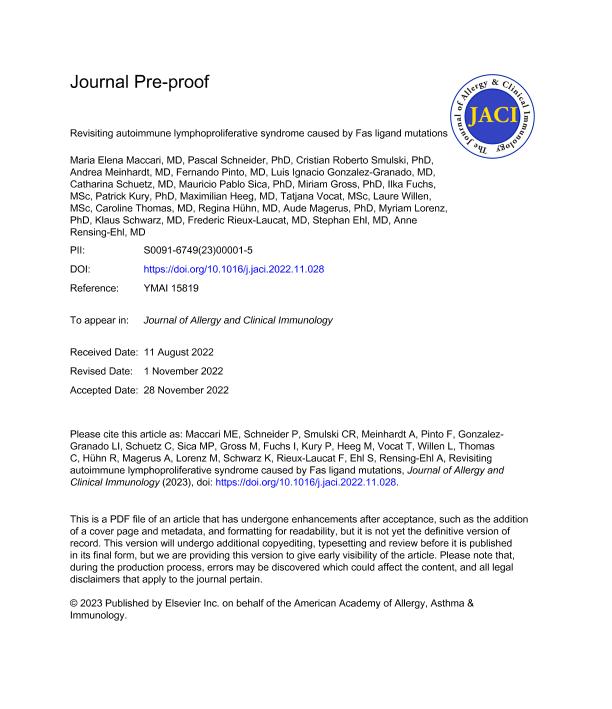Artículo
Revisiting autoimmune lymphoproliferative syndrome caused by Fas ligand mutations
Maccari, Maria Elena; Schneider, Pascal; Smulski, Cristian Roberto ; Meinhardt, Andrea; Pinto, Fernando; Gonzalez Granado, Luis Ignacio; Schuetz, Catharina; Sica, Mauricio Pablo
; Meinhardt, Andrea; Pinto, Fernando; Gonzalez Granado, Luis Ignacio; Schuetz, Catharina; Sica, Mauricio Pablo ; Gross, Miriam; Fuchs, Ilka; Kury, Patrick; Heeg, Maximilian; Vocat, Tatjana; Willen, Laure; Thomas, Caroline; Hühn, Regina; Magerus, Aude; Lorenz, Myriam; Schwarz, Klaus; Brieux Olivera, Amelia Carolina Marta; Ehl, Stephan; Rensing Ehl, Anne
; Gross, Miriam; Fuchs, Ilka; Kury, Patrick; Heeg, Maximilian; Vocat, Tatjana; Willen, Laure; Thomas, Caroline; Hühn, Regina; Magerus, Aude; Lorenz, Myriam; Schwarz, Klaus; Brieux Olivera, Amelia Carolina Marta; Ehl, Stephan; Rensing Ehl, Anne
 ; Meinhardt, Andrea; Pinto, Fernando; Gonzalez Granado, Luis Ignacio; Schuetz, Catharina; Sica, Mauricio Pablo
; Meinhardt, Andrea; Pinto, Fernando; Gonzalez Granado, Luis Ignacio; Schuetz, Catharina; Sica, Mauricio Pablo ; Gross, Miriam; Fuchs, Ilka; Kury, Patrick; Heeg, Maximilian; Vocat, Tatjana; Willen, Laure; Thomas, Caroline; Hühn, Regina; Magerus, Aude; Lorenz, Myriam; Schwarz, Klaus; Brieux Olivera, Amelia Carolina Marta; Ehl, Stephan; Rensing Ehl, Anne
; Gross, Miriam; Fuchs, Ilka; Kury, Patrick; Heeg, Maximilian; Vocat, Tatjana; Willen, Laure; Thomas, Caroline; Hühn, Regina; Magerus, Aude; Lorenz, Myriam; Schwarz, Klaus; Brieux Olivera, Amelia Carolina Marta; Ehl, Stephan; Rensing Ehl, Anne
Fecha de publicación:
01/2023
Editorial:
Mosby-Elsevier
Revista:
Journal of Allergy and Clinical Immunology
ISSN:
0091-6749
e-ISSN:
1085-8725
Idioma:
Inglés
Tipo de recurso:
Artículo publicado
Clasificación temática:
Resumen
Background: Fas ligand (FasL) is expressed by activated T cells and induces death in target cells upon binding to Fas. Loss-of-function FAS or FASLG mutations cause autoimmune-lymphoproliferative syndrome (ALPS) characterized by expanded double-negative T cells (DNT) and elevated serum biomarkers. While most ALPS patients carry heterozygous FAS mutations, FASLG mutations are rare and usually biallelic. Only 2 heterozygous variants were reported, associated with an atypical clinical phenotype. Objective: We revisited the significance of heterozygous FASLG mutations as a cause of ALPS. Methods: Clinical features and biomarkers were analyzed in 24 individuals with homozygous or heterozygous FASLG variants predicted to be deleterious. Cytotoxicity assays were performed with patient T cells and biochemical assays with recombinant FasL. Results: Homozygous FASLG variants abrogated cytotoxicity and resulted in early-onset severe ALPS with elevated DNT, raised vitamin B12, and usually no soluble FasL. In contrast, heterozygous variants affected FasL function by reducing expression, impairing trimerization, or preventing Fas binding. However, they were not associated with elevated DNT and vitamin B12, and they did not affect FasL-mediated cytotoxicity. The dominant-negative effects of previously published variants could not be confirmed. Even Y166C, causing loss of Fas binding with a dominant-negative effect in biochemical assays, did not impair cellular cytotoxicity or cause vitamin B12 and DNT elevation. Conclusion: Heterozygous loss-of-function mutations are better tolerated for FASLG than for FAS, which may explain the low frequency of ALPS-FASLG.
Archivos asociados
Licencia
Identificadores
Colecciones
Articulos(CCT - PATAGONIA NORTE)
Articulos de CTRO.CIENTIFICO TECNOL.CONICET - PATAGONIA NORTE
Articulos de CTRO.CIENTIFICO TECNOL.CONICET - PATAGONIA NORTE
Citación
Maccari, Maria Elena; Schneider, Pascal; Smulski, Cristian Roberto; Meinhardt, Andrea; Pinto, Fernando; et al.; Revisiting autoimmune lymphoproliferative syndrome caused by Fas ligand mutations; Mosby-Elsevier; Journal of Allergy and Clinical Immunology; 151; 5; 1-2023; 1391-1401
Compartir
Altmétricas



